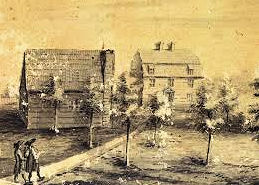In 1680 William Penn, a Quaker, was granted land by King Charles II of England. He hoped to make this area “Penn Woods” a haven for religious sects being persecuted in Europe. German settlers moved into this area known by the Lenni Lenape as “maguntsche,” or "feeding place of the bears".
Settlers, mostly German Lutheran and Reformed denominations, arrived in early 1700’s, probably coming up the South Mountain Trail where the Shelter House in Emmaus is located. The Moravians had established an industrial settlement in Bethlehem in 1741, and local settlers Jacob Ehrenhardt and Sebastian Knauss found themselves drawn to the church. In 1742, William Penn’s sons granted Jacob Ehrenhardt and Sebastian Knauss land which they in turn donated to the Bethlehem Moravian church. A settlement was established as a closed community with strict rules governing all. They built a small log church on what would become the settlement’s cemetery God’s Acre. In 1747 a schoolhouse opens, and in 1747 the local Moravian congregation was founded. 
in 1758 the congregation purchased 102 acres of land from the settlers and surveyed and laid out the village of Emmaus. There was a total of 32 house lots and 17 field lots. In 1759 the first house was erected for Andreas Giering and his wife Maria. In April of 1761, the name Emmaus was given to the settlement by Bishop Spangenberg, from a hymn he’d written recalling Christ’s appearance to two of his disciples on the road to Emmaus. It was written in Pennsylvania German with one “m” and a dash above the “m” or Emaus. This dash signified two “m’s”, however, the name was recorded as Emmaus. In 1830 the owns name was changed from Emmaus to Emaus and non-Moravian members were allowed to own land within the village boundaries. And it wasn't until 1938 that the name was changed back to Emmaus.
The Moravian faith had strict adherence to the rules of the church. One couldn’t travel without permission of the “Warden,” no meetings could be held in the dark, marriages had to be approved by the church elders, and restrictions against noise and youthful playing were strictly enforced. The Moravians also refused to bear arms, swear oaths or to take part in political discussions. When trouble arose between the English king and the colonies, the community was faced with a series of events which sorely tried their faith. They were asked to swear an oath which would break their allegiance to King George III, and they were required by the Continental Congress to join the Pennsylvania Militia. Fines, imprisonment and confiscation of property faced those who refused to participate. The church diaries kept by the Moravian ministers make no mention of the fact 12 men from Emmaus did enlist in the Continental Army.
Note: In 1859 was the year that the East Pennsylvania Branch of the Reading Railroad arrived, and Emmaus became a borough.